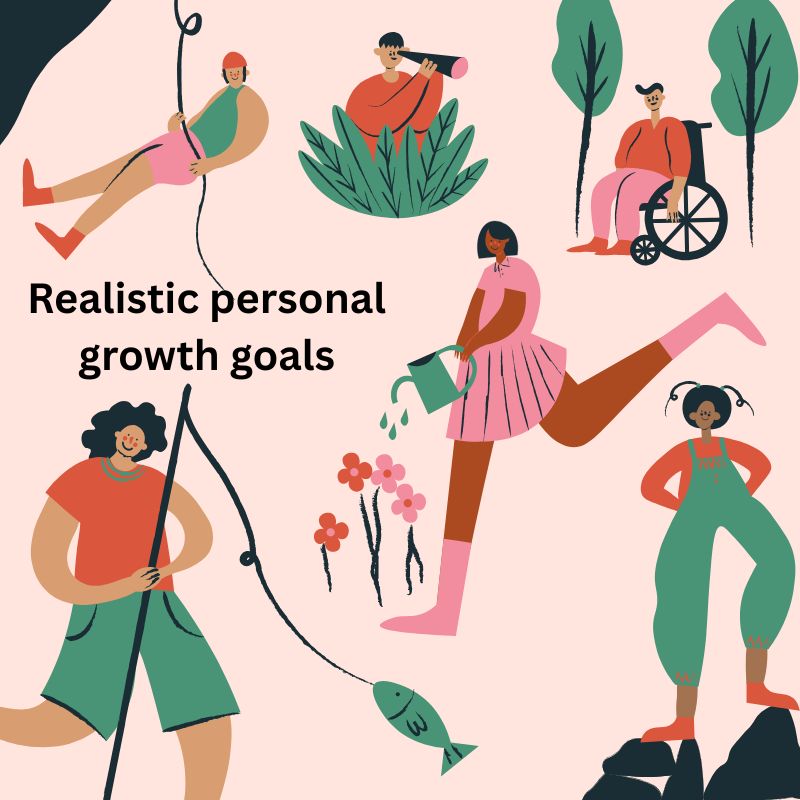Setting personal growth goals is exciting, but let’s be honest many of us start strong and then lose momentum. Why? Because we aim for perfection instead of progress. In 2025, the focus is on realistic, sustainable goals that fit into your lifestyle and help you grow without burning out.
In this guide, you’ll learn 10 actionable strategies, how to avoid common mistakes, and ways to stay motivated so your goals don’t just look good on paper, they actually work.
1. Improve Your Time Management
Time is the most valuable resource you have. If you can’t manage time, your growth goals will remain dreams.
- Why it matters: Poor time management leads to stress and procrastination.
- Actionable tip: Use tools like Google Calendar, Notion, or Trello to plan your day. Block out time for learning, exercising, and relaxation.
2. Stop Procrastinating Before It Stops You

Procrastination is a silent killer of personal development. It delays progress and builds guilt.
- Why we procrastinate: Fear of failure, lack of clarity, or feeling overwhelmed.
- Quick hack: Break large tasks into micro-goals. Instead of saying, “I’ll write a book,” start with “I’ll write 100 words today.”
3. Limit Social Media Usage for Better Focus
Social media can be a massive distraction. On average, people spend over 2.5 hours daily scrolling time that could be used for growth.
- Action step: Set app limits or use focus apps like Freedom or Forest.
- Bonus: Replace scrolling with a quick self-improvement activity, like reading or journaling.
4. Practice Self-Care Without Guilt
Self-care isn’t selfish it’s essential. When you recharge, you perform better in every area of life.
- Try this: Incorporate mindful breathing, journaling, or a digital detox day each week.
- Pro tip: Treat self-care as a scheduled commitment, not an afterthought.
5. Work on Your Public Speaking Skills
Great communication opens doors in both personal and professional life.
- Start small: Practice speaking confidently in small groups or record yourself for feedback.
- Extra tip: Join Toastmasters or try impromptu speaking exercises daily.
6. Prioritize Physical Health as a Growth Goal
Your body is the engine of your growth journey. Without good health, progress stalls.
- Simple steps: Walk 10,000 steps daily, drink enough water, and aim for 7-8 hours of sleep.
- Why it matters: Exercise improves brain function and mental clarity, helping you stay sharp.
7. Focus on the Present, Not Just the Future
Constantly chasing future goals can cause stress and dissatisfaction.
- Practice mindfulness: Use techniques like deep breathing, gratitude journaling, or guided meditation apps.
- Why: Being present helps you appreciate small wins and reduces anxiety.
8. Create Work-Life Balance That Actually Works
Burnout kills personal growth faster than failure.
- Signs of imbalance: Constant fatigue, no personal time, and declining productivity.
- Solution: Set boundaries, limit work emails after hours and schedule leisure activities.
9. Develop a Growth Mindset for Resilience
A growth mindset means seeing challenges as opportunities, not obstacles.
- How to build it: Reframe negative self-talk. Instead of “I can’t do this,” say “I can learn this.”
- Remember: Failure is feedback, not the end.
10. Boost Your Communication Skills
Strong communication is a superpower.
- Try these: Practice active listening, make eye contact, and ask open-ended questions.
- Result: Better relationships, career growth, and confidence.
11. How to Use SMART Goals for Personal Growth
SMART goals make your dreams measurable and achievable:
- Specific: Define what you want clearly.
- Measurable: Track progress (e.g., 3 books per month).
- Achievable: Start small before scaling big.
- Relevant: Align with your core values.
- Time-bound: Set deadlines for accountability.
12. Common Mistakes When Setting Growth Goals
- Setting too many goals at once.
- Ignoring the role of habits in long-term success.
- Focusing only on outcomes, not the process.
13. How to Stay Consistent and Motivated
- Use habit stacking: Attach new habits to existing ones (e.g., read 5 minutes after brushing your teeth).
- Track progress: Use apps or a journal to stay accountable.
- Reward yourself: Celebrate small wins to keep motivation high.
Conclusion
Personal growth isn’t about perfection it’s about progress and consistency. When you set realistic goals and follow these strategies, you’ll create lasting change without feeling overwhelmed. Start small, stay consistent, and watch your life transform one step at a time.
Ready to turn your personal growth goals into reality? Start by setting one small goal today and commit to it for the next 7 days. Need more practical tips and proven strategies? Subscribe to our newsletter now and unlock weekly insights to help you grow smarter, faster, and stronger in 2025.
FAQs
1. What are examples of realistic personal growth goals?
Examples include reading 10 pages daily, exercising 3 times a week, or reducing social media time by 30 minutes a day.
2. How do I stay motivated to achieve personal goals?
Track your progress, set mini rewards, and find an accountability partner.
3. What is the difference between SMART goals and personal growth goals?
SMART goals are a framework for achieving any goal. Personal growth goals focus on self-improvement and use SMART principles for clarity.
4. How many personal goals should I set at once?
Start with 2-3 high-impact goals to avoid overwhelm and improve consistency.
5. Can personal growth goals improve career success?
Absolutely! Skills like communication, time management, and resilience directly impact career growth.

